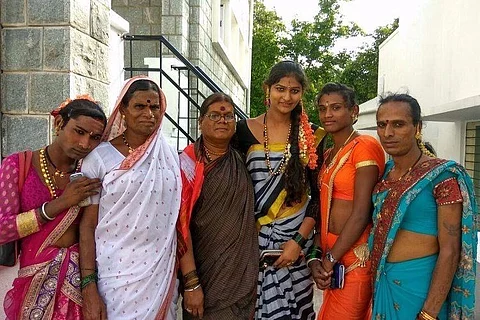

In the six batches on Sustainable Agriculture course Baduku has conducted so far, over 90% of students have been cis men.
For its seventh batch due to start in August, the college of alternative livelihood, run by Bengaluru-based NGO Samvada, is looking for more cis women, and transgender persons, to apply for the course.
"Women are mostly invisible in the agriculture sector even though they are the ones directly involved in it. Men usually look after income generating activities," says Ramesh C, in-charge of the course.
In fact, a study conducted by Oxfam found that women in India did 80% of farm work, but in comparison owned a measly 13% of land. Baduku wants to address this gap.
"Since last year, we have been trying to get more cis women and transgender persons interested in organic farming and organic produce entrepreneurship. These communities too have a right to have their own land and start their own businesses," Ramesh says.
The Sustainable Agriculture course takes place over the planting and harvesting season and is meant for farmers interested in organic farming and entrepreneurship. While there is no tuition fee, there is a food accommodation fee of Rs 1,500 for the entire course and this can further be subsidised for applicants who cannot pay the amount.
"Farmers are suffering. Agriculture as a profession is suffering. And the environment is suffering. We have reached a crisis stage where farmers don't find their practice sustainable for themselves. They are forced to kill themselves or to sell their land and migrate to cities. This course is to help farmers get more control over their own professions and their livelihoods, and to help them convert their current agricultural practices into an organic one," says Nitya Vasudevan of Badaku.
The course will teach farmers about various aspects of sustainable agriculture such as seed conservation, eco-friendly practices that are also low on cost, drip irrigation, mixed cropping, etc. Since converting to organic farming is a time taking process, a mentoring process will continue for sometime after the six-month course is over.
The Baduku Community College was founded by Samvada in 2007 in order to help young people from marginalised communities enter socially-critical professions.
For instance, they have a nine-month journalism course for youngsters from the working class or backward backgrounds. Once they finish the course, they are placed in mainstream media houses across Karnataka.
Baduku’s other objective is to create new professions, as Nitya explains. "Jobs that are not otherwise seen as professions. Something like Solid Waste Management is not considered a profession. It is seen as voluntary work or scavenging, or something that does not have dignity, or as an environmental issue. It is not seen as a something that people can do to earn a livelihood. Same goes for early childcare provided by people we call nannies or ayahs."
Nitya, who is the convener of Badaku's Centre for Wellness and Justice, points out that each profession has its own gender biases. 90% of the applicants they get for their feminist counselling or early childcare courses are women.
The same also holds for agriculture. "The woman is never seen as the farmer, even if majority of the farm work done by them. If you see official figures, the farmer is always a man. Secondly, women farmers also have the additional responsibility of looking after children and household chores. They don't have the time to come for modules every month," she states.
While inviting applications from the marginalised communities is definitely a start, it is however not a solution to a multifaceted problem.
"With transgender persons, they are kept out of mainstream profession so much so that when they enter professions, they want something which is immediately lucrative and respectable. They don't imagine entering agriculture. They also don't own land. It is a difficult and tricky situation to address. The approach has to be more invested," she says.
Those interested in applying for the Sustainable Agriculture course can contact Ramesh C at 9611562812 and Sampath at 7892548274.